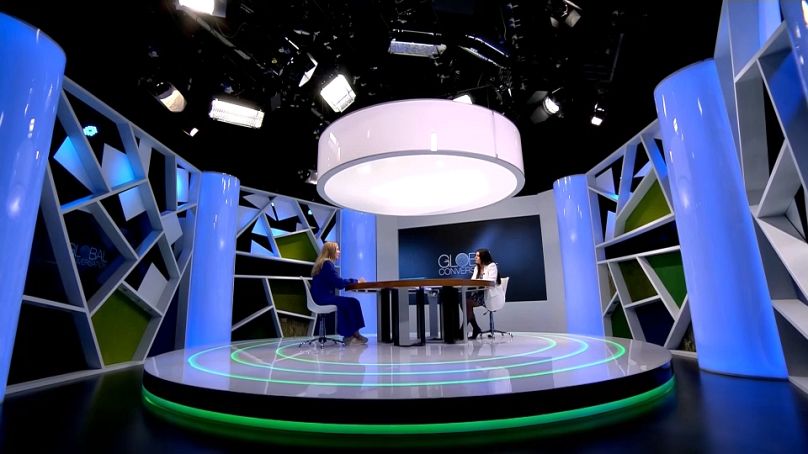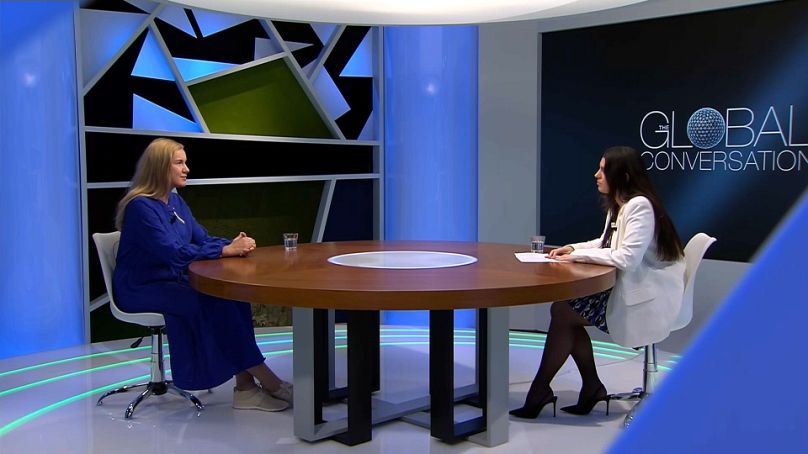Spiralling inflation, an unhealthy dependence on Russian energy, and the risk of power cuts. The EU Commission faces one of its toughest winters on record. Energy Commissioner, Kadri Simson wants a price cap on Russian gas and urgers households to do what they can to save energy.
"**The approach towards Russia and other partners has to be different. I personally also believe that this is necessary to introduce a price cap for Russian gas because we don't have sanctions on gas yet. So even if we are facing the crisis and we don't have enough supplies, households are protected."**Kadri Simson,European Commissioner for Energy
 ADVERTISEMENT
ADVERTISEMENT
 ADVERTISEMENT
ADVERTISEMENT
Spiralling inflation, an unhealthy dependence on Russian energy, and the risk of power cuts. The European Commission faces one of its most concerning winters on record. So, what solutions can it provide? And how is it planning to ease the impact of growing bills on citizens? Euronews reporter Aïda Sanchez was joined on the Global Conversation with the European Energy Commissioner Kadri Simson.
Aïda Sanchez, Euronews
The Commission president has just announced new sanctions. What do you think they will be?
Kadri Simson, European Commissioner for Energy
Well, this is ongoing work. And we are ready to react when we see that the previous packages have left something out of the scope. And this is what you can expect from ongoing work to ensure that Russia will not earn additional revenues that are unfair and that will help them to finance their war against Ukraine.
Aïda Sanchez, Euronews
And which are those things that have been left out of the scope previously, like concretely which proposals?
Kadri Simson
Well, it is a matter of implementation. And during the implementation, when you already have a consensual agreement on some sectors and services, you discover that you need to be well-targeted more specifically.
Aïda Sanchez, Euronews
And will they also have a focus on energy?
Kadri Simson
Energy has been covered already by several sanctions. I personally also believe that this is necessary to introduce a price cap for Russian gas because we don't have sanctions on gas yet. But this is unfair, that Russia who is manipulating with their supplies will partially cover the cut volumes with higher prices.
Aïda Sanchez, Euronews
This price cap on Russian gas was mentioned before, but it was not in the last proposal from the commission. Why was it not there?
Kadri Simson
There were many questions about how we will secure our security of supply before this winter and next year. But we do know that Russia doesn't have alternative pipeline connexions that allow them to sell the gas that they will not sell to their existing buyers who do have valid contracts. They don't have the chance to sell it to someone else. And that's why the price gap might be a way further so that they still have the only opportunity to earn some revenue. But they are cut off from surplus revenues that are currently available for them too.
Aïda Sanchez, Euronews
And do you think that other Member States will also be wanting to have this price cap on Russian gas? Because some of them didn't want before?
Kadri Simson
Indeed, this is a very complicated issue because we have to take care of our available volumes so that we do need to get safely through this winter. At the same time, Member States have done a lot already. They have implemented measures to cut the overall gas consumption and they have been very successful in storage filling activities. So right now, this is more than 86% full, our underground gas storage. And this is higher than we just agreed in the middle of the summer.
Aïda Sanchez, Euronews
Some countries also wanted a gas price cap in all the imported gas to Europe. Do you think this can work?
Kadri Simson
The approach towards Russia and other partners has to be different. And at the same time, we do have a very good cooperation with countries who are connected with us via our gas pipeline Norway, Azerbaijan, and Algeria, all of them. We do have existing energy dialogues and of course, we will reach out to them and try to find a way so that the price will be more affordable. And then there is of course LNG market. We have to be sure that this is not manipulated, and that there are benchmarks that allow us to attract additional LNG volumes that we do need.
Aïda Sanchez, Euronews
So from your words, I understand that from the Commission part, there won't be a proposal on a price cap on all gas imports. It's a no from the European Commission?
Kadri Simson
No, the work is ongoing. But our biggest concern is how to design something like this so that our volumes and the ones we can attract will not hurt.
Aïda Sanchez, Euronews
And now going into the measures that the Commission has proposed, what will be the first measures that citizens will see? Because both the solidarity tax and the market revenues are technically a bit difficult to implement.
Kadri Simson
Well, across EU 27 member states, citizens have had a chance to see already some of the results. Last week's proposal this is targeting that market situation where there is a scarcity of supply.
Aïda Sanchez, Euronews
But the money the Commission is expecting to raise by these two taxes, when will it be available?
Kadri Simson
The price cap for these electricity producers who are producing electricity with significantly lower costs than for example, gas-fired power plants. This money will be available for governments to use and support retail consumers and small businesses, and this will be available immediately.
Aïda Sanchez, Euronews
And the solidarity contribution? When will we see that?
Kadri Simson
Solidarity contribution then addresses the revenues, the surplus revenues that fossil fuel companies are earning this year. That means it doesn't provide additional contributions before the end of the year.
Aïda Sanchez, Euronews
In the proposal, there is also a 5% mandatory cut in the demand of electricity. How will the European Commission make sure that the Member States follow it?
Kadri Simson
This is a binding obligation and that means that the Member States actually do know what is necessary to do. Well, demand response and good contracts with big consumers are in place. It just means that we have to use them more frequently.
Aïda Sanchez, Euronews
Will we see a situation where citizens are also needed to reduce their demand? So citizens also have to save energy actively?
Kadri Simson
Well, households are protected customers. So even if we are facing a crisis and we don't have enough supplies, households are protected. But saying that it doesn't mean that every one of us should do our utmost to save energy. This is a reasonable attitude. It helps us to lower the bills. But at this very moment, if millions of Europeans will behave correctly and will not waste energy, that means that our industry doesn't have to face also this situation, that there is a rationing needed.
Aïda Sanchez, Euronews
Thank you very much Commissioner for being here. Thank you for your time.












